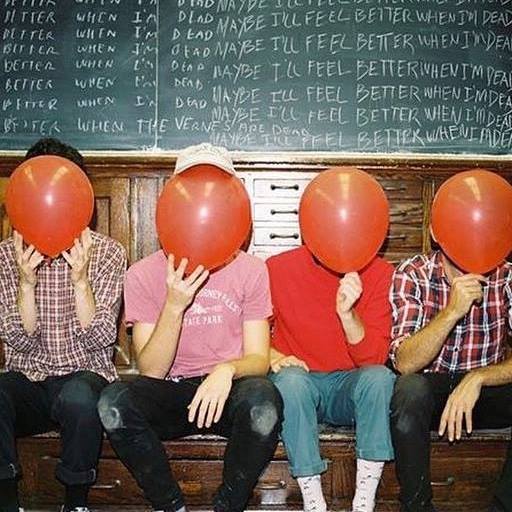Maybe I’ll Feel Better When I’m Dead, the sophomore LP from The Vernes, is the band’s first official studio album, which was produced by Joe Michelini (American Trappist, ex-River City Extension) at Berlin Studios. Building off the skillful songwriting and lyricism, found on the project’s self-titled debut full-length (on which frontman Matthew Gragg also wrote and played all the instruments himself), this is the quartet’s first collaborative effort that features Fabian Mera (lead guitar), and Cole Berggren (bass), and Pat Degan (drums).
Its opening/title track is an ideal representation of Gragg’s songwriting style, as he tends to tackle shadowy themes amid the backdrop of rather upbeat instrumentation. That dichotomy finds a lovely balance between sadness and hope, making the deeply personal and introspective tales feel universal, while taking on struggles and thoughts that we all most likely have conjured up, at one point, in our minds. The themes of maturing and not exactly knowing where one belongs are reoccurring ones throughout the record. “Maybe I’ll Feel Better When I’m Dead” is followed by “1994,” the first song that was actually written for the LP. Inspired by a visit from his brother, while Gragg was living in San Francisco, and the positive changes that he had noticed in him during their time together at Big Sur, the guitars find a sweet spot between its textured layers and fiery conclusion that ultimately makes for the heaviest rocker on the album.
“Zurich 1953” is an acoustic instrumental that’s a fitting prelude to “Untitled, No. 2”. The songs seem to easily flow together on the album. “Some say that you’re the chosen one/But I don’t look at you that way/Say that you’re the only one/I’m sort of hoping that you go away” – that “chosen one” reference finds its way later on among the crunchy guitars of “Bug(s)”; however, “you are not the chosen one and I am not the chosen one” is realized, casting a melancholy that seems to blanket the entire collection. An ominous rumble introduces “Everything Goes Away,” before hearing the nostalgically poignant verse – “In this city that I call my home/Well they’re cutting down trees and they’re building new roads/And they name all the streets after all of the trees that they cut down to build all the roads that we see.” Change seems inevitable, though our protagonist refuses to give into it.
Closing out the album is “Tired Shoes,” with what sounds like a ballad being played on a lonely player piano to a melody reminiscent of “Auld Lang Syne”. Like the New Year’s classic (and the record’s title track), there is a hint of sadness and hopefulness for the end. With that existential struggle rearing its head throughout the LP, we can only hope to be “proud of the roads that we choose.” The Vernes definitely have the right to be proud of the choices that they’ve made on their latest release. (Photo by Bob Sweeney) – H.M. Kauffman
